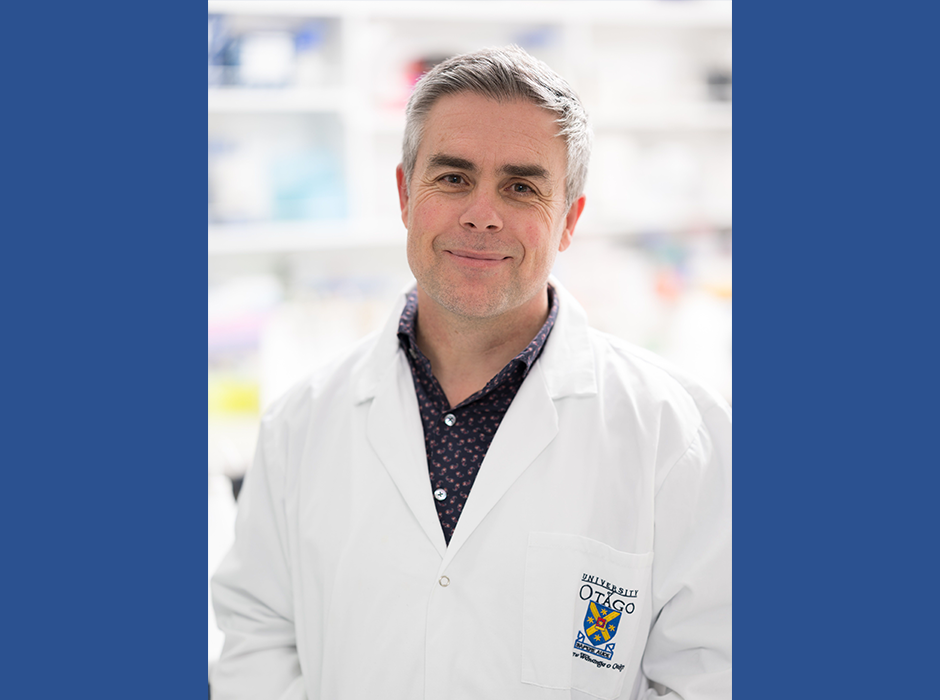
Associate Professor Logan Walker and his contribution to cancer research have been acknowledged with a nomination as a semi-finalist at the 2024 Kiwibank New Zealander of the Year awards.
No-one was more surprised than Associate Professor Logan Walker when an email arrived informing him he’d been selected as a semi-finalist for next year’s Kiwibank New Zealander of the Year awards Ngā Tohu Pou Kōhure o Aotearoa 2024.
“I immediately thought this can’t be true– it must have been sent in error or to the wrong person,” says Associate Professor Walker, Associate Dean Research, University of Otago, Christchurch.
But it is indeed true – Associate Professor Walker is one of ten nominees chosen by judges for the Innovator of the Year category.
The semi-finalists in all seven categories will go on to the next stage of judging, announced in late February 2024, where three finalists in each category will be chosen.
Leading the cancer genomics efforts of the Mackenzie Cancer Research Group within the University of Otago Christchurch’s Department of Pathology and Biomedical Sciences, Associate Professor Walker’s research focuses on improving the application of genomic technologies in health services to reduce the impact of cancer in our communities.
Genetic health, or healthcare based on knowing our genetic code, is an exciting and critical research area developing at rapid pace, with cheaper and more powerful DNA-based technologies revolutionising cancer diagnosis, Associate Professor Walker says.
“However, the major challenge that comes with this is figuring out how to decode this information to benefit patients and their whānau. My research is therefore focussed on developing new methods to help evaluate the clinical significance of these genetic variants in our DNA code.”
Associate Professor Walker is understood to be the first Aotearoa New Zealand researcher awarded both a Sir Charles Hercus Health Research Fellowship and a Rutherford Discovery Fellowship.
As well as a decade leading the cancer genomics efforts of the Mackenzie Cancer Research Group, he is co-director of Genetics Otago with Dr Louise Bicknell, and has been invited onto multiple international genetic expert panels affiliated with organisations including ClinGen, ENIGMA and the BRCA Challenge.
His self-chosen personal research highlights include, firstly, the discovery that women who inherit BRCA1 with a section of the gene missing have the highest risk of developing breast cancer (for reasons that remain poorly understood); and secondly, that women who inherit a BRCA1 mutation appear to have lower than expected cancer risk if they also inherit a single copy of the SULT1A1 gene, where the copy from either their mother or father has been deleted.
“These discoveries have the potential to help clinical geneticists and patients decide the timing of implementing risk-reducing treatment options. SULT1A1 can also be targeted with therapeutics in the hope of reducing familial breast cancer risk,” Associate Professor Walker says.
He and his team are currently steering two of the largest international studies of breast cancer and endometrial cancer, both backed by HRC Project Grants in collaboration with world-leading consortia (CIMBA, the Endometrial Cancer Association Consortium, and the Breast Cancer Association Consortium), aimed at discovering new genes to help determine whether women will develop both cancers.
“Our research team leaders, Dr George Wiggins and Dr Vanessa Lau, are working on projects aimed at developing novel preventative medicines to lower cancer risk in women genetically pre-disposed to breast and ovarian cancers. It’s early days, but if successful, these therapeutics will be transformative in controlling and reducing the social and economic impact of cancer.”
The Kiwibank New Zealander of the Year Awards acknowledge New Zealanders whose work benefits the country by inspiring and leading others.
Awards organisers say they received a record number of nominations this year, and that making the semi-finals “is no mean feat”.
All finalists and winners will be recognised at an official Awards dinner on March 27 in Auckland.